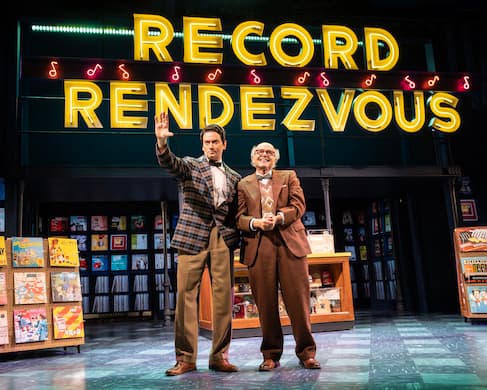Music’s Power on Display in New Off-Broadway Production ‘Rock & Roll Man’
The musical focuses on a legendary disc jockey, Alan Freed, and the far-reaching effects of his decision to showcase Black artists in the early 1950s. The producer, Rose Caiola, and star actor, Constantine Maroulis, speak with the Sun.

In the new musical “Rock & Roll Man” set to open off-Broadway Wednesday night, there’s a scene set in the early 1950s in which a fledgling radio disc jockey named Alan Freed is called on to fill in for one of his colleagues. Rather than sticking to the assigned playlist of middle-of-the-road fare, Freed opts to spin some rhythm and blues discs he’s picked up in a local store at Cleveland, showcasing Black artists. The station manager is appalled, at least until a gaggle of white teenage girls, including his own daughter, calls in to squeal approval.
For the actor and singer Constantine Maroulis, who plays Freed in the production, the sequence, like so many in the musical, has personal resonance. “My parents were born in the 1930s,” Mr. Maroulis, a one-time “American Idol” finalist whose numerous musical theater credits include a Tony Award-nominated performance in “Rock of Ages,” says. “There are literally pictures of my mother and her sister at the same time as teenagers, in their PJs, probably listening to the ‘Rock ’n’ Roll Dance Party,’” the program that Freed would host after moving to New York and gaining national attention.
Those of a certain age likely remember Freed, who is credited with inventing the term “rock & roll,” for that program, or for producing concerts that featured racially mixed bills and appealed to similarly diverse audiences. “Rock & Roll Man” digs deeper into his legacy, and his troubles: By the time Freed died in 1965 at 43, his career had been decimated by heavy drinking and legal woes; implicated in the payola scandal that swept the music industry in the late ’50s, when Congress investigated stations accused of taking money to play recordings without disclosure, Freed was further accused of falsely accepting songwriting credit.
The musical’s producer, Rose Caiola, who also collaborated on its book with a former journalist and longtime touring producer and manager, Larry Marshak, and a veteran musician, Gary Kupper, had not heard much about Freed prior to coming on board. “But when I learned about this individual who created such a cultural shift, who had the beginning of the civil rights movement in his trajectory, I thought, what a great story,” she says.
Ms. Caiola, whose numerous producing credits range from the children’s book adaptation “Freckleface Strawberry the Musical,” which she also co-wrote, to current Broadway productions, “knew I didn’t want to just do a jukebox musical,” she notes. “I love that genre, but for me, it’s more fascinating to have original music telling the story in a traditional musical theater sense. But we also wanted to have the catalog of songs that were an integral part of Alan’s career.”
Thus, audiences will hear actors deliver classic hits playing such icons as Chuck Berry, Little Richard, Jerry Lee Lewis, and LaVern Baker, and will also be introduced to new tunes by Mr. Kupper, who played piano with Berry for more than 30 years. Ms. Caiola was keen that Freed also be a singing role, and she approached Mr. Maroulis personally.
“We’re Facebook friends, and I just reached out and said, ‘I think I have a part that is so you,’” Ms. Caiola says. “Constantine’s voice, it’s quintessential to the rock ’n’ roll genre; it’s so explosively gorgeous and captivating. If Alan Freed could have sung, I’m sure he would have wanted to sound like that. I think the component of social change in Alan’s trajectory was something that fascinated Constantine, too — but I also think he found an opportunity to create a character that’s all his own.”
Mr. Maroulis, who studied theater at the Boston Conservatory and acted off-Broadway before gaining attention on “Idol,” was moved by “the bravery Alan Freed displayed. To think it wasn’t even a lifetime ago that kids couldn’t hang out together to listen to music and dance, because some of them looked different from the others. We’re still dealing with that issue in many ways today, of course.”
The show follows Freed through a “dream bubble,” as Mr. Maroulis describes it, as he looks back from “what is actually his deathbed.” As Ms. Caiola explains, there’s also “a courtroom premise,” in which Freed is tried “in the court of public opinion, because that’s where we all live, especially these days.”
The notorious original FBI director, J. Edgar Hoover, is a major character: “He really was like Javert in ‘Les Miserables,’ chasing Alan Freed, determined to stop him,” Ms. Caiola muses. “The majority of deejays were taking payola at that time, but they were playing cover versions [of songs by Black artists], and Alan would only play originals. … There were people in conventional society who didn’t want segregation to stop, and J. Edgar Hoover was one of them.”
While Ms. Caiola is keen to stress that “Rock & Roll Man” is “not a concert,” both she and Mr. Maroulis are aware of its nostalgic power. “My father always listened to that lo-fi-sounding ’50s music on AM radio when I was growing up, songs like ‘Good Golly, Miss Molly’ and ‘Tutti Frutti,’” Mr. Maroulis recalls. “They always jumped out at me, and they still do. The vocals are incredibly authentic, and the minimalist arrangements just slam. It’s so distinct; those records just sound so great.”
At a recent preview, Ms. Caiola says, “I saw all these people on their feet, clapping and singing along with every song, and it just brought tears to my eyes. This piece does that; it brings joy and inspires people, and that’s why I work in theater.”

